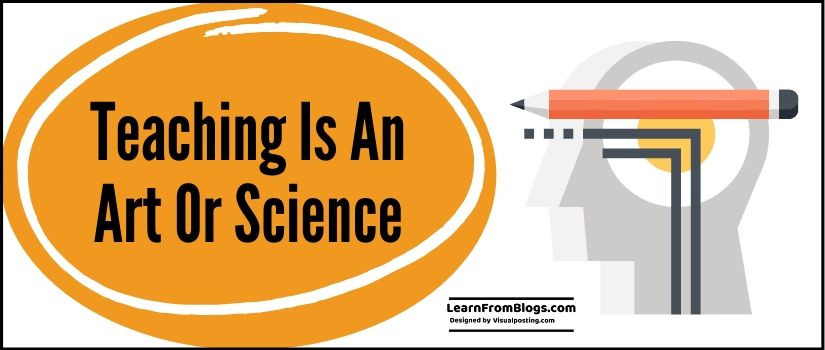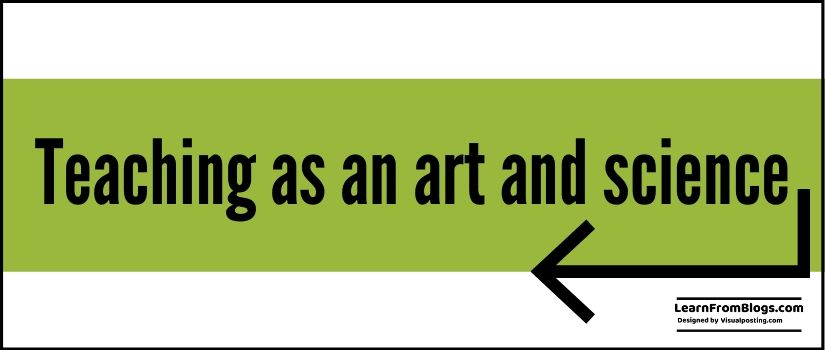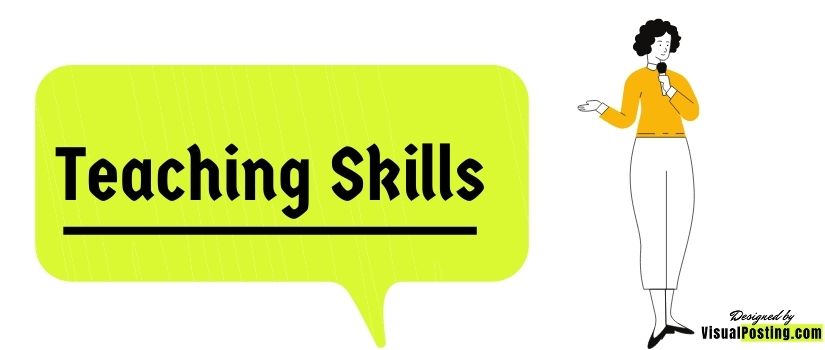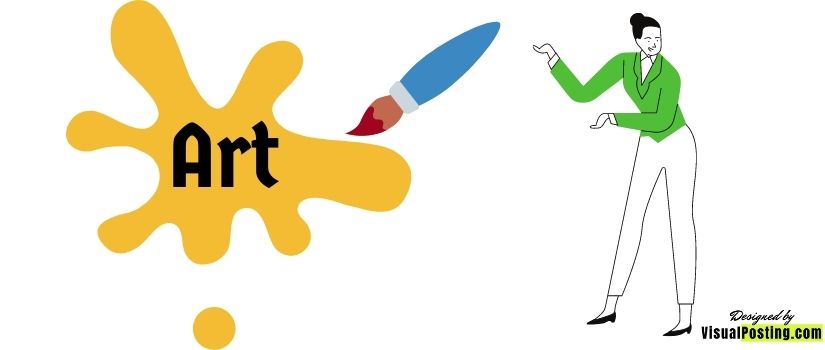
Teaching encompasses two fundamental dimensions: Art and Science. The Art of teaching involves the creative process of shaping or selecting materials to effectively convey ideas or emotions in visually engaging ways, mirroring the role of a teacher.
Conversely, the Science of teaching involves the systematic study and examination of methods that can be tested and verified. Teachers constantly analyze situations and adapt their approaches accordingly.
Thus, teaching is inherently a blend of both Art and Science, and effective teaching necessitates the harmonious integration of both elements.
Teaching as an Art
Teaching as an art showcases the imaginative approaches educators employ to engage students, making learning enjoyable and captivating. It is emphasised that teachers utilizing artistic methods must possess a thorough understanding of the subject matter and conduct extensive research before instruction.
In the realm of teaching, there exists a need for instructors to identify the methodologies and tactics that align with their individual preferences and styles. Each teacher is unique, and what proves effective for one may not necessarily yield the same results for another.
Consequently, educators should assimilate various teaching strategies and tailor them to suit specific instructional contexts and personal teaching philosophies.
Teachers must cultivate their pedagogical principles, identify their distinctive strengths, and learn how to leverage them effectively in the classroom.
Teaching requires both art and science. They both play a role in each other because if a teacher demonstrates only one of these types of teaching, they cannot do effective teaching.
Teaching is a Science
Educating is a systematic process that involves employing logical methods to impart knowledge to students. It often follows traditional teaching approaches where instructors deliver lessons to their classes.
For instance, a common practice is lecturing on a particular topic. However, this method can sometimes be dull and challenging for teachers to maintain student engagement. Nevertheless, effective teaching requires a scientific foundation.
Teaching is considered a science because educators gather data through observation to assess learning progress and determine the most effective teaching methods. Similar to scientists, teachers experiment with various strategies to evaluate their effectiveness.

Teaching as an art and science
Effective teaching requires the seamless integration of both artistry and scientific methodology within the classroom. Neglecting to leverage scientific knowledge in pedagogy risks employing ineffective teaching methods and principles. Striking a balance between the creative elements of teaching and its scientific underpinnings facilitates optimal learning experiences for students, enhancing their ability to absorb and retain information while remaining engaged.
Consequently, proficiency in teaching cannot be attained unless educators adeptly merge both the art and science of their craft. To excel as a teacher, one must not only stay informed about the latest research and developments in education but also continually hone the skill of applying this knowledge in practice.
Thus, teaching emerges as a discipline that encompasses both artistic expression and scientific rigour.







Dhritikesh Nath
IS TEACHING AN ART OR SCIENCE?
Is teaching primarily an art, a science, or a blend of both? Teaching can be seen as an art informed by science. This perspective offers a balanced view that acknowledges the multifaceted nature of the profession.
Throughout history, teaching has been revered as a divine art, essential for the transmission of knowledge. As you engage with this article, consider the role of your teachers in shaping your understanding.
Teaching isn't merely a hereditary trait; it's a skill that can be cultivated over time. In the following discussion, we'll explore the scientific and philosophical underpinnings of the teaching profession.
TEACHING AS AN ART
Teaching embodies both artistry and scientific principles. While some view it primarily as an art form, emphasizing its philosophical dimensions, others see it as a blend of both art and science. I've encountered numerous passionate individuals who hold this perspective.
Yet, effective teaching requires not only passion but also knowledge. It's not uncommon for individuals with high intelligence to struggle as educators.
Many incorporate teaching into personality development programs, recognizing its transformative power. Interestingly, teaching can also be a means of self-learning; by instructing others, you deepen your understanding. Indeed, learning through teaching is a powerful concept.
How Do I Learn to Teach?
Many students have adopted a learning strategy where they take on the role of a teacher to enhance their understanding. While this approach can be beneficial, it's crucial to execute it systematically. Here are some valuable tips tailored for professional educators to teach effectively:
Please adhere to the following guidelines to facilitate deep learning:
1. START WITH THE BASICS
Uncertainty poses a significant challenge for students, making it essential for teachers to guide them with clarity.
To effectively support your students, it's crucial to provide clear and concise explanations. Without clarity, reaching your students becomes difficult. I suggest beginning with the fundamentals.
Allocate 5-10 minutes for a quick review. For example, if the topic is electricity, start by discussing the basics.
Pose a question such as, "What do you know about electricity?" This approach sparks curiosity naturally, encouraging engagement from your students.
Hence, emphasizing the importance of starting with the basics.
2. BE IN A JOLLY MOOD
Many students find overly strict teachers difficult to connect with. If you fall into this category, it's important to consider making adjustments. Your absence might be a relief for them.
I'm not suggesting you abandon discipline altogether but rather find a balance. Creating a jovial atmosphere where students feel comfortable asking questions is key.
Reflecting on my own experiences as a student, I feel intimidated by overly strict teachers. While I never hesitated to ask questions, there was a certain unease present.
Injecting humour into your lessons can make them more engaging and easier to grasp for students.
A teacher with a lively and approachable demeanour tends to leave a lasting impression on their students' hearts.
3. ASK QUESTIONS OFTEN
Both students and teachers engage in asking questions, a practice I perceive as indistinguishable.
The act of posing questions serves to captivate students over extended durations and satiate their hunger for knowledge.
As learners, they may veer off course, susceptible to distractions. To mitigate this, interject with pertinent inquiries.
It's imperative, however, to tailor your questions to each student's aptitude. Avoid bombarding struggling students with challenging queries, as this could demoralize them and breed embarrassment.
Instead, calibrate your inquiries to align with each student's cognitive abilities. As an educator, it's incumbent upon you to gauge the academic standing of your students.
Consequently, I advocate for frequent questioning to maintain academic engagement.
4. SET PERFECT EXAMPLES
Demonstrating rather than just advising is far more impactful. As a teacher, you must embody both roles effectively.
Leading by example not only facilitates learning for your students but also streamlines your teaching efforts.
It's crucial to choose examples that directly relate to the topic at hand. Irrelevant illustrations can convolute understanding, leading to increased confusion among students.
As a dedicated educator, you aim to minimize such challenges.
Therefore, it's imperative to present flawless examples that resonate with your students' learning objectives.
5. ALLOW THEM TO TEACH
Teaching serves as an effective avenue for personal learning, despite the seeming contradiction. By putting yourself in your students' shoes, you empower them and enhance their confidence. This approach fosters problem-solving skills and encourages adaptability.
After your lesson, nominate a student to articulate the concepts covered. Providing them with the opportunity to express themselves not only reinforces their understanding but also alleviates any apprehension they may have about speaking up.
Encourage them to step into your role, as doing so promotes a deeper engagement with the material.
THE SCIENTIFIC ASPECT OF TEACHING
From a scientific perspective, the educational process appears intricate, involving elements of human psychology and intelligence.
Effective teaching holds the capacity to engage all our senses and enhance our lives through a scientific lens, but it requires dedication and commitment.
According to research conducted at Harvard University, the brain absorbs only 10% of the information presented, which is then translated into electrical signals for processing.
Subsequently, the brain interprets these signals to make decisions.
Establishing robust teaching fundamentals is crucial to initiating this entire process.
Strengthening these foundations can potentially increase the absorption rate to 15-20%.
Thus, the stages of the teaching process unfold in this manner.
SYNOPSIS
To effectively impart your wisdom, consistent daily reading is essential, yet often overlooked.
Many inquiries delve into the debate of whether teaching is an art or a science, but with your query resolved, clarity is achieved.
Teaching embodies elements of both artistry and scientific methodology. Regrettably, nefarious influences have tainted this noble craft, introducing the disruptive forces of monetary gain and political maneuvering.
Access to knowledge is the inherent right of every individual. Fulfilling this right necessitates the guidance of dedicated educators.
For some, the act of teaching brings a profound sense of fulfilment, fostering inner tranquillity.
While this is heartening news, there remain steadfast intellectuals committed to the integrity of their craft.
It is incumbent upon each of us to join their ranks and safeguard the essence of teaching.
Even amidst pursuits of profit, let us embrace the role of educator, contributing positively to the preservation of this venerable art.
As children, none of us looked forward to going to school. I often fantasized about a life without the constraints of education, where I could spend my days playing and watching TV without a care for studying. It seemed like an idyllic existence to my young mind.
However, I was unaware of the importance of education and knowledge in the real world. I didn't realize then how essential schools are for shaping our futures.
Despite receiving guidance from excellent teachers throughout my school and college years, I often resented them for their disciplinary actions.
However, upon reflection, I now understand that their efforts were all for my benefit.
Looking back on my school and college days, I've come to appreciate the value of education and the role it plays in shaping our lives for the better.
During my school days, my favourite teacher was the mathematics instructor, despite their strict demeanor. What captivated me were the ingenious teaching techniques they employed, which made the subject fascinating.
Mathematics isn't my forte due to my struggles with calculations and recalling problem-solving methods.
Surprisingly, I managed to achieve commendable scores in my board exams, all thanks to my math teacher who simplified the subject for me.
Reflecting on it now, I understand the magic of my math teacher's prowess: their exceptional teaching skills.
Surely, you must have encountered a teacher in your life whom you initially disliked due to their strictness. However, their teaching prowess was undeniable. Their skill was unmatched by any other.
Indeed, teaching is an art, and all teachers are artists. Imagine a scenario where numerous concepts still need to be revised with guidance.
Without the efforts of our teachers, whether it be in geography, history, or science, grasping these subjects would be far more challenging. Their ability to simplify complex topics is invaluable.
Acknowledge the unique approach each teacher brings to the classroom. It's common to praise a teacher's exceptional teaching abilities, attributing it to their innate talent. However, it begs the question: Is teaching more of an art or a science?